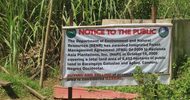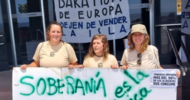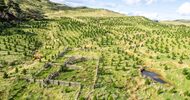26 April 2010
World People's Conference on Climate Change and the Rights of Mother Earth
Cochabamba, Bolivia, April 19 to 22, 2010
Conclusions of working group 17 on Agriculture and Food Sovereignty
You have to revalorize local agriculture
At the plenary session held on Wednesday April 21 at the coliseum in the municipality of Tiquipaya, working group No. 17 Agriculture and Food Sovereignty, presented and approved the conclusions of the 27 items proposed during earlier discussions. Group President Luis Andragó, Ecuadorian leader of the FENOCIN Association, along with Vice President Leonilda Zurita, leader of the Bolivian Association of Peasant Women 'Bartolina Sisa', submitted the following conclusions to attendees and the general Plenary:
Social movements and popular organizations gathered at the CMPCC confirm that despite our constant protests and numerous allegations, the capitalist governments, international agencies, and financial institutions continue on a path towards exacerbating the destruction of the planet. Climate change is one of the most serious threats to food sovereignty for all peoples of the world. Once again we observe that: revalue
1. Agribusiness through its social, economic and cultural development of globalized capitalist production and its logic of food production for the market and not to fulfill the right to food is a major cause of climate change. Land use change (deforestation and expansion of the agricultural frontier), monocultures, production, marketing, and use of pesticides and agrochemical inputs, industrial food processing, and all of the logistics involved in transporting them thousands of miles to reach the consumer, the production of greenhouse gases in the huge garbage and manure dumps from intensive industrial livestock facilities are major contributors to the climate crisis and the growing number of hungry people in the world.
2. That plundering and destruction of aquifers, springs, and water bodies and ecosystems and ecological cycles that give life are inextricably linked to processes of privatization that are driven by capitalist governments and international agencies. At the same time, we see how climate change will destroy glaciers and other water sources. We find that the basic human right of access to water for consumption, to living organisms, and to food production is restricted on a daily basis due to the expansion of industrial agriculture, mining, oil extraction, industrial food processing, forest plantations, planting and production of biofuels, industrial aquaculture, and hydroelectric megaprojects.
3. That the territorial deployment of mega infrastructure projects in the service of capital alters natural, social and cultural processes making forms of harmonious coexistence with Mother Earth impossible, destroying livelihoods, driving rural, indigenous/native, and fishing communities from their territories and facilitating the expansion of an extractive and agro-export model.
4. Climate change causes forced migration in rural areas and is a threat to indigenous/native peoples, peasant communities and fishermen who are most harmed through the destruction of their livelihoods, their ancestral and local agricultural wisdom, and hence their identity.
5. That biofuels are not an alternative because they prioritize agricultural production for transport over production of food for humans. Biofuels expand the agricultural frontier, destroying forests and biodiversity, generate monocultures, promote the concentration of land, the degradation of soils, and the depletion of water sources, contribute to rising food prices, and consume more energy than they generate.
6. That Genetically Modified Organisms (GMOs) are not a solution to climate change and are only a tool of corporations to control seeds and food globally. They signify a serious attack on local knowledge, human health, the environment, local autonomy and impede the effective implementation of the Right to Food.
7. They continue to develop technologies to serve the interests of big business while trying to pass them off as solutions to different crises now facing Mother Earth and Humanity. We know that they are all false solutions used as tools for accumulation and business for large multinationals, which only exacerbate the dependency, the concentration, and destruction. Among others we can highlight geo-engineering, nanotechnology, terminator and similar technologies, synthetic biology and biochar.
8. That the advance of free trade through economic partnership agreements, treaties on free trade and investment protection, among others, are a direct attack on the sovereignty of countries and peoples, autonomy of the States and the ability of multilateral action by international agencies. As implementation progresses, there is an increase in the destructive impacts on local economies, food sovereignty, environmental, social and cultural rights of peoples and the rights of Mother Earth.
9. That the current worsening of hoarding of land and oceans by economic groups, corporations and both state and private speculative capital are some of the most serious and imminent attacks faced by people and their food, social, and political sovereignty. The extreme concentration and foreignization of land, compounded by the current free trade rules are an attack on plant and animal biodiversity, on land reform, and on the reconstitution process of indigenous and peasant lands for which social movements have struggled indefatigably.
10. That various forms of Intellectual Property Rights are an instrument of privatization that destroys local, traditional, and scientific knowledge systems restricting the use and conservation of agricultural biodiversity and outlawing cultural practices and local, community, and ancestral agriculture. Faced with this reality that people around the world endure, we the social movements and popular organizations gathered for this CMPCC pledge to continue fighting for a set of solutions and to mobilize in order to ensure that governments fulfill their duty to carry them out. We will center our efforts on the building of food sovereignty, defending and supporting peasant and indigenous agriculture as sources of food, as a wellspring of dignity and identity, and as a real and concrete alternative for cooling the planet, and believe in ensuring gender equality at the heart of our action. The solutions that we see as priorities are:
11. Enhance and restore agri-cultures and local, rural, and indigenous/native livelihoods, and ancestral knowledge systems of production and harvesting of food, local and traditional health systems that have been degraded and undervalued by the agribusiness logic oriented towards overproduction, export and profit generation, noting that Food Sovereignty is the way to respond and solve climate change.
12. Promote and secure funding policies as well as socially participative and public control mechanisms for agricultural production systems to avoid damage to Mother Earth. These should include research, extension, and public investment to eliminate the use of petrochemically-based agricultural inputs, to improve soil organic content, reduce post-harvest losses, strengthen local markets, promote urban agriculture, protect sources and bodies of water, and support indigenous/native peasant family farming and Food Sovereignty.
13. Defend, revalorize, and disseminate the sustainable model of peasant and indigenous/native agricultural production, and other ecological models and ancestral practices that contribute to solving the problem of climate change and ensure food sovereignty. This is understood as the right of peoples to control their own seeds, land, water, and food production, thus ensuring - through production in harmony with Mother Earth, and which is locally, and culturally appropriate - the peoples’ access to sufficient, varied, and nutritious foods which complement Mother Earth and deepen autonomous production (participatory, community oriented, and shared) of each nation and people. At the same time we reject global food standardization and its nutritional, environmental, social, cultural and health impacts.
14. Recognize the right of all peoples, living beings and Mother Earth to have access to and enjoy water. Likewise, recognize the right of peoples and countries to control, regulate, and plan the supportive and respectful use and management of water and its cycles in the framework of agreements and international conventions and customary law, banning any form of privatization and commodification of water, creating popular participation bodies to regulate its multiple uses, protect its quality, and plan future use for consumption by living organisms and food production. In this context, we support the proposal from the Government of Bolivia to recognize water as a fundamental human right as expressed in the "Declaration on the Human Right to Water" and we see it as an important step in the right direction.
15. Ban technologies and technological processes that endanger the welfare and survival of Mother Earth and living things and that are only driven by their potential to produce profits for a small number of companies, while at the same time cause and accelerate climate change such as: agrofuels, genetically modified organisms, nanotechnology, geoengineering and all those that - under the assumption that they help the climate - in fact undermine food sovereignty and are an assault on Mother Earth. Impose a permanent worldwide ban on terminator technology, pharma crops and similar technologies.
16. Prohibit fisher trawling which is predatory and destructive of biodiversity and the livelihoods of artisanal fishermen.
17. Prohibit large scale mining pollution that destroys ecosystems, expels local populations, pollutes waterways, and threatens the food sovereignty of peoples.
18. Reject, condemn, and prohibit any political-military and trade strategy that undermines the food sovereignty of peoples and makes them more vulnerable to climate change.
19. Uphold the primacy of human, economic, social, and cultural rights as well as the rights of Mother Earth and biodiversity over the TRIPS (treaties protecting intellectual property) and any other trade agreement under international law. Countries must also ensure respect for the collective knowledge of indigenous/native and peasant communities, and therefore the collective right of decision making about access to and use of this knowledge. National measures to implement this would not be subject to proceedings under the rules of trade agreements that strengthen or protect intellectual property rights. Any formal investigation developed with public support must be for the public good, not subject to intellectual property rules that restrict information sharing.
20. Prohibit any form of patenting and intellectual property of any form of life and ancestral and traditional knowledge canceling existing patents.
21. Prohibit dumping (selling products below production cost) and unfair trade practices of industrialized countries that distort food prices and affect food sovereignty thus making non-industrialized countries the most vulnerable to climate change.
22. Implement policies and regulations to protect small domestic food production, including the type of subsidies they consider necessary for their agricultural sector, as well as ensuring their right to set tariff barriers equivalent to any subsidy incorporated in exported products and allowing the free movement of local production.
23. Affirm that the central part of the solution to climate change is through the strengthening and expansion of peasant and native agri-food systems, urban agriculture, and artisanal fishing. This means that not only is it necessary to change the logic of industrial food production oriented towards global markets and profit, but to change the concept that assumes that the earth is a resource open for exploitation, without rights, and oriented towards merely satisfying the greed of human beings. We the people gather together to declare that the planet is a living entity with rights and a spirit.
24. Promote broad based, deep, and genuine agrarian reform processes and the reconstitution of indigenous, Afro, and peasant territories building participatory rural villages with a focus on gender, so that peasant, indigenous/native peoples, their cultures and lifestyles regain their central and vital role in world agriculture in order to achieve food sovereignty and restore harmony for the achievement of global climate balance. Agrarian reform of this kind must include respect for local and ancestral knowledge and ensure the necessary arrangements to ensure production at all stages of the chain (cultivation, processing, and marketing). We demand the recognition of the rights of indigenous peoples in voluntary isolation and that their territories be recognized and respected.
25. Promote and strengthen holistic education (spiritual, physical and social) for Food Sovereignty as a foundation for the changes needed to integrate their proposals at all levels of formal and non-formal education, developing content born out of local realities and based on a multicultural vision and the full participation of communities responding to the needs of each region and community. At the same time, we maintain that the extensive information and communication on these issues is one of the biggest challenges we face.
26. To declare native and wild seeds as the heritage of peoples in the service of humanity, as the foundation of Food Sovereignty, and their free movement through the hands of indigenous/native and peasant peoples; cared for and multiplied by the custodians of seeds according to the cultures of each people.
27. Require that the impacts of global warming on Food Sovereignty are inserted within the framework of discussions on climate change and are inserted into national legislation."
These conclusions will be put up for debate at the next summit to be held this December in Cancun, Mexico.














